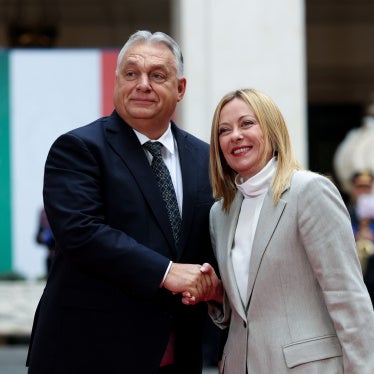(Brussels) - As European Union officials prepared to travel to Belgrade, Human Rights Watch urged that the E.U. insist on Yugoslav cooperation with the international war crimes tribunal.
"The end of the abusive Milosevic regime is a welcome development," said Holly Cartner, Executive Director of Human Rights Watch's Europe and Central Asia Division. "But there can be little hope of a clean break with the past unless the indicted architects of ethnic cleansing are brought to justice."
In a letter sent to all E.U. foreign ministers, the human rights monitoring group urged them to tell their counterparts in Belgrade that future E.U. funding to the Yugoslav government will require cooperation with the International Criminal Tribunal for the Former Yugoslavia, including the arrest and transfer of indicted war criminals living in Serbia.
"In the early weeks after the October revolution, President Kostunica could plausibly argue that he needed time," said Cartner. "But the honeymoon is now over and the international community should make clear to Yugoslav officials that it demands cooperation with the Tribunal."
Human Rights Watch also urged the E.U. to adopt a common position on aid to Yugoslavia that would make E.U. assistance conditioned on cooperation with the Tribunal and other reform measures. Although Prime Minister Goran Persson of Sweden, which currently holds the rotating E.U. Presidency, is reported to have told Yugoslav President Vojislav Kostunica last week that continued E.U. funds require cooperation with the Tribunal, the E.U. has not formally adopted this position as binding policy. The United States government has set 1 April as the deadline by which Yugoslav authorities must be cooperating with the Tribunal, including the arrest and transfer of indictees, or else face a funding cut-off.
Human Rights Watch made the appeal after the Tribunal prosecutor, Carla Del Ponte, recently received a chilly welcome in Belgrade from President Kostunica. Questioning the legality and procedures of the Tribunal, Kostunica reportedly told Del Ponte that his government would not cooperate in the apprehension of indicted war crimes suspects for trial by the Tribunal in the Hague.
Yugoslav government officials have said that they intend to try former President Slobodan Milosevic in a local court. Rights groups and Tribunal officials insist that any trials for war crimes must take place before the international tribunal.
"According to United Nations resolutions, which are binding on Yugoslavia, the Tribunal must have the first opportunity to try war criminals," explained Cartner. "In this case, it's hard to imagine that a Serbian court could do justice for Croatian, Bosnian and Kosovar victims of Serb war-time abuses. Only an international forum can guarantee accountability in an even-handed way."







